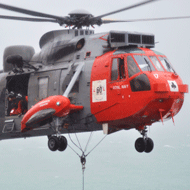
Young calf 'miraculously' appears unharmed after 100ft fall
A young female calf has at last been rescued, five days after falling 100ft over a cliff into an inaccessible cove in Cornwall.
The seven-month-old dexter calf had been grazing on the cliff top when a large landslip caused her to fall into the cove below Lizard lighthouse in Cornwall. The farmer had been grazing a small herd of the red-coated cows on the cliff top as part of a project for Natural England.
After reporting the incident to the RSPCA on Friday, January 17, the farmer was advised to drop wet hay over the cliff to ensure the calf received enough food and hydration while the rescue was coordinated.
The rescue took five days to plan and execute and help was sought from the Royal Naval Air Station at Culdrose, who made available a search and rescue helicopter.
RSPCA chief inspector Neil Thomas said: "Myself and another rope rescue trained inspector managed to set a guide line into the cliff and work out a route down to the cove. Then a team of eight people comprising four RSPCA inspectors and one animal welfare officer, two Royal Naval ground crew and a vet descended to the cove."
The calf is "remarkably" said to have been uninjured and had been drinking from rainwater puddles as well as eating the hay thrown down.
After being guided into position on a tarpaulin placed over a cargo net, the calf was sedated by the vet and airlifted to a secure field at the farm on the Lizard peninsula.
Praising those involved with the rescue, Mr Thomas said: "This rescue was carried out in appalling weather conditions with a very strong Southerly gale blowing all day and frequent very heavy showers.
"The skill and courage shown by the helicopter crew in these conditions was absolutely remarkable and deserving of recognition."
Image courtesy of the RSPCA.



 The latest
The latest